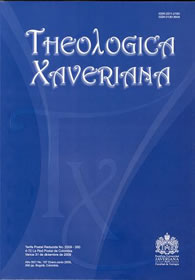Abstract
This reflection presents two fundamental biblical categories, especially meaningful for sacramental theology: promise and covenant. They are presented in an intimate relationship to one another, as much in their content as in their realization in the course of history and revelation until their fulfillment in the new covenant. After an introduction presenting the context and the general projection of this reflection, a syntactical confirmation is presented, associated with a semantical interpretation. This biblical-theological and hermeneutical confirmation and interpretation serves as a framework for a new approach to sacramental theology in general and of some sacraments in particular. The conclusion proposes pragmatically the acquired elements in the form of suggestions for systematic theology, practical theology, liturgical and practical theology, catechetical work and spirituality.
This journal is registered under a Creative Commons Attribution 4.0 International Public License. Thus, this work may be reproduced, distributed, and publicly shared in digital format, as long as the names of the authors and Pontificia Universidad Javeriana are acknowledged. Others are allowed to quote, adapt, transform, auto-archive, republish, and create based on this material, for any purpose (even commercial ones), provided the authorship is duly acknowledged, a link to the original work is provided, and it is specified if changes have been made. Pontificia Universidad Javeriana does not hold the rights of published works and the authors are solely responsible for the contents of their works; they keep the moral, intellectual, privacy, and publicity rights.
Approving the intervention of the work (review, copy-editing, translation, layout) and the following outreach, are granted through an use license and not through an assignment of rights. This means the journal and Pontificia Universidad Javeriana cannot be held responsible for any ethical malpractice by the authors. As a consequence of the protection granted by the use license, the journal is not required to publish recantations or modify information already published, unless the errata stems from the editorial management process. Publishing contents in this journal does not generate royalties for contributors.


